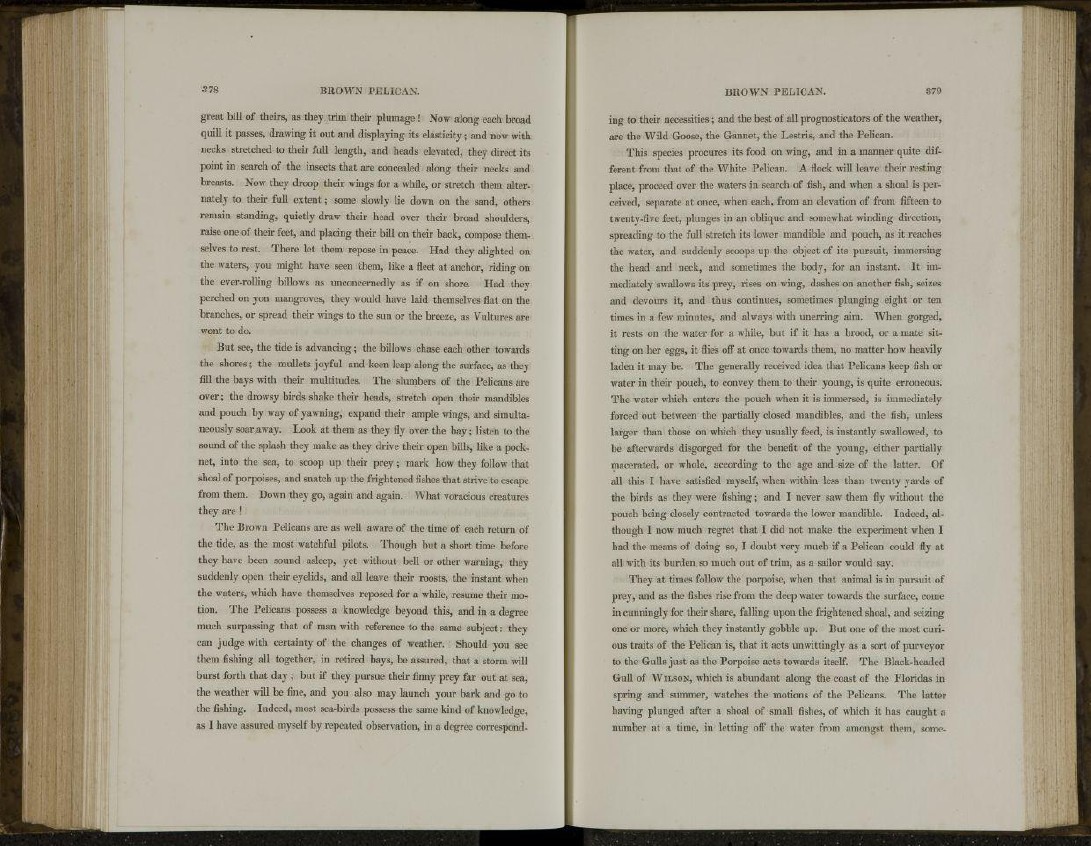
great bill of theirs, as they trim their plumage ! Now along each broad
quill it passes, drawing it out and displaying its elasticity; and now with
necks stretched to their full length, and heads elevated, they direct its
point in search of the insects that are concealed along their necks and
breasts. Now they droop their wings for a while, or stretch them alternately
to their full extent; some slowly lie down on the sand, others
remain standing, quietly draw their head over their broad shoulders,
raise one of their feet, and placing their bill on their back, compose themselves
to rest. There let them repose in peace. Had they alighted on
the waters, you might have seen them, like a fleet at anchor, riding on
the ever-rolling billows as unconcernedly as if on shore. Had they
perched on yon mangroves, they would have laid themselves flat on the
branches, or spread their wings to the sun or the breeze, as Vultures are
wont to do.
But see, the tide is advancing; the billows chase each other towards
the shores; the mullets joyful and keen leap along the surface, as they
fill the bays with their multitudes. The slumbers of the Pelicans are
over; the drowsy birds shake their heads, stretch open their mandibles
and pouch by way of yawning, expand their ample wings, and simultaneously
soar away. Look at them as they fly over the bay; listen to the
sound of the splash they make as they drive their open bills, like a pocknet,
into the sea, to scoop up their prey ; mark how they follow that
shoal of porpoises, and snatch up the frightened fishes that strive to escape
from them. Down they go, again and again. What voracious creatures
they are !
The Brown Pelicans are as well aware of the time of each return of
the tide, as the most watchful pilots. Though but a short time before
they have been sound asleep, yet without bell or other warning, they
suddenly open their eyelids, and all leave their roosts, the instant when
the waters, which have themselves reposed for a while, resume their motion.
The Pelicans possess a knowledge beyond this, and in a degree
much surpassing that of man with reference to the same subject: they
can judge with certainty of the changes of weather. Should you see
them fishing all together, in retired bays, be assured, that a storm will
burst forth that day ; but if they pursue their finny prey far out at sea,
the weather will be fine, and you also may launch your bark and go to
the fishing. Indeed, most sea-birds possess the same kind of knowledge,
as I have assured myself by repeated observation, in a degree corresponding
to their necessities ; and the best of all prognosticators of the weather,
are the Wild Goose, the Gannet, the Lestris, and the Pelican.
This species procures its food on wing, and in a manner quite different
from that of the White Pelican. A flock will leave their resting
place, proceed over the waters in search of fish, and when a shoal is perceived,
separate at once, when each, from an elevation of from fifteen to
twenty-five feet, plunges in an oblique and somewhat winding direction,
spreading to the full stretch its lower mandible and pouch, as it reaches
the water, and suddenly scoops up the object of its pursuit, immersing
the head and neck, and sometimes the body, for an instant. It immediately
swallows its prey, rises on wing, dashes on another fish, seizes
and devours it, and thus continues, sometimes plunging eight or ten
times in a few minutes, and always with unerring aim. When gorged,
it rests on the water for a while, but if it has a brood, or a mate sitting
on her eggs, it flies off at once towards them, no matter how heavily
laden it may be. The generally received idea that Pelicans keep fish or
water in their pouch, to convey them to their young, is quite erroneous.
The water which enters the pouch when it is immersed, is immediately
forced out between the partially closed mandibles, and the fish, unless
larger than those on which they usually feed, is instantly swallowed, to
be afterwards disgorged for the benefit of the young, either partially
macerated, or whole, according to the age and size of the latter. Of
all this I have satisfied myself, when within less than twenty yards of
the birds as they were fishing; and I never saw them fly without the
pouch being closely contracted towards the lower mandible. Indeed, although
I now much regret that I did not make the experiment when I
had the means of doing so, I doubt very much if a Pelican could fly at
all with its burden, so much out of trim, as a sailor would say.
They at times follow the porpoise, when that animal is in pursuit of
prey, and as the fishes rise from the deep water towards the surface, come
in cunningly for their share, falling upon the frightened shoal, and seizing
one or more, which they instantly gobble up. But one of the most curious
traits of the Pelican is, that it acts unwittingly as a sort of purveyor
to the Gulls just as the Porpoise acts towards itself. The Black-headed
Gull of WILSON, which is abundant along the coast of the Floridas in
spring and summer, watches the motions of the Pelicans. The latter
having plunged after a shoal of small fishes, of which it has caught a
number at a time, in letting off the water from amongst them, some